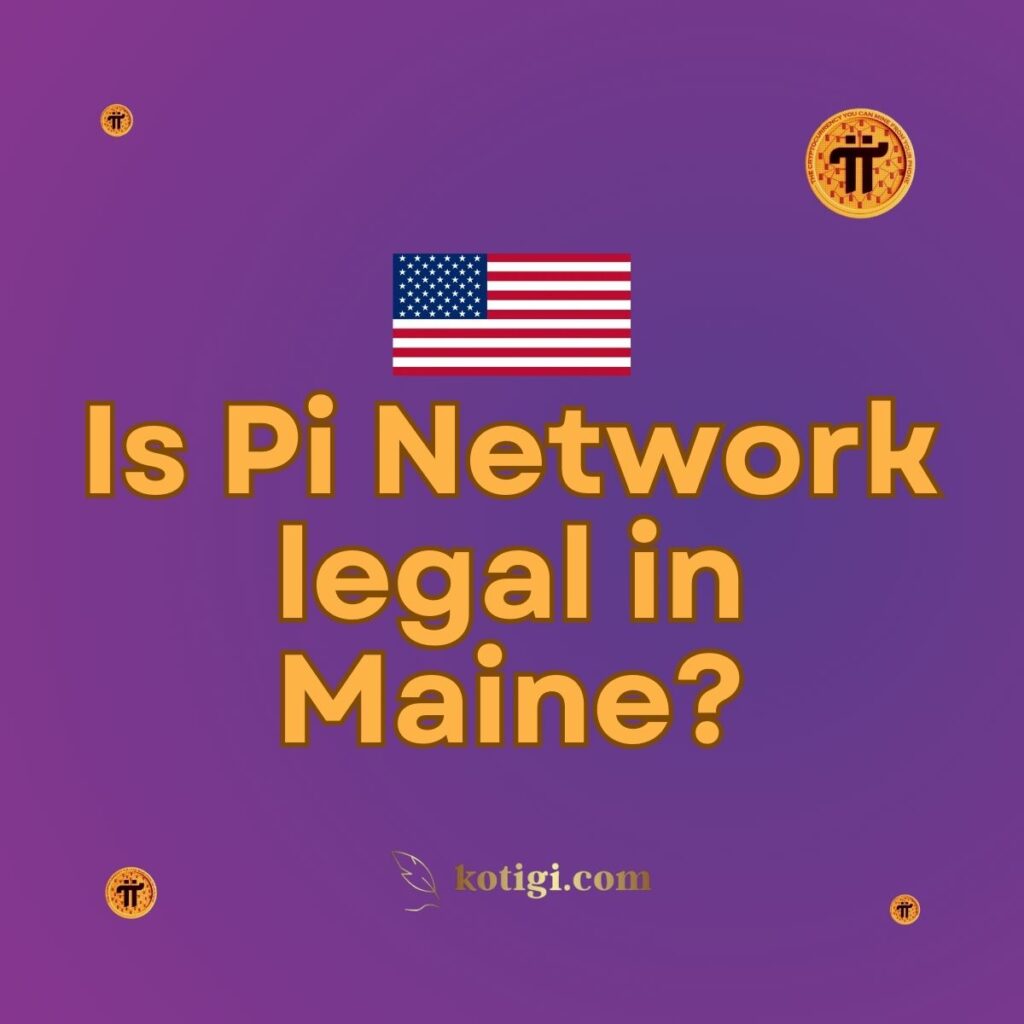
Is Pi Network legal in Maine?
Yes, Pi Network is legal in Maine, where residents can participate in mobile mining and other network activities without specific state-imposed restrictions. While Maine does not have cryptocurrency-specific laws, it follows federal guidelines, and participants are encouraged to stay informed on any changes that might affect digital assets in the future.
Introduction
Pi Network’s mobile-based cryptocurrency mining model has garnered a strong following, including in Maine, where digital assets are met with an open regulatory stance. The state has no specific restrictions on Pi Network, allowing Maine residents to explore its unique ecosystem. This article examines Pi Network’s legal status in Maine, the broader regulatory landscape, consumer protection, economic potential, and practical resources for Maine participants interested in engaging with blockchain technology responsibly and effectively.
Cryptocurrency Regulations and Legal Framework in Maine
Maine’s Approach to Cryptocurrency and Digital Assets
Maine’s regulatory environment is relatively permissive when it comes to digital assets, which means that Pi Network users can engage without state-imposed restrictions. The Maine Bureau of Consumer Credit Protection (BCCP) oversees financial activities but has yet to establish specific cryptocurrency regulations, making Maine a favorable state for digital currency exploration.
Current Legal Status of Pi Network in Maine
Pi Network is legal in Maine, where its mobile mining model is treated similarly to other blockchain applications. Maine residents can participate freely, but users should remain vigilant of any future state or federal regulations that could affect digital currency platforms like Pi.
Blockchain Support and Future Regulatory Possibilities
Maine is open to blockchain innovation, aligning with broader trends to encourage digital asset development. Although the state does not yet regulate Pi Network, future state policies could focus on blockchain consumer protections, especially as digital assets gain mainstream adoption.
Federal Oversight and Its Influence on Pi Network Users in Maine
SEC Guidance on Cryptocurrencies and Non-Tradable Tokens
The Securities and Exchange Commission (SEC) provides guidance on cryptocurrencies, focusing on assets classified as securities. Currently, Pi tokens are non-tradable, exempting them from SEC regulation. Maine participants in Pi Network should stay updated on this guidance, as future trading status could change how Pi tokens are legally viewed.
IRS Classification and Tax Implications for Maine Residents
The Internal Revenue Service (IRS) considers digital assets as taxable property. Currently, Pi tokens are non-monetary, meaning Maine residents do not owe taxes on them. However, should Pi tokens become tradeable, users will need to report gains as taxable income, making it beneficial for participants to keep records of their mining activity.
Consumer Financial Protection Bureau (CFPB) and Digital Asset Rights
The Consumer Financial Protection Bureau (CFPB) oversees consumer rights in financial transactions, including digital assets. Although Pi Network does not yet fall under CFPB regulation, Maine residents can benefit from its guidance on maintaining secure financial activities within digital platforms.
Consumer Protection and Safety Measures for Pi Network Users
Maine’s Consumer Protection Laws and Cryptocurrency
Maine’s Unfair Trade Practices Act prohibits deceptive practices, which could apply to Pi Network if the tokens gain value and are used in transactions. Although the non-monetary nature of Pi tokens means they aren’t currently covered, Maine residents are still protected from fraud, enhancing user confidence.
Recommended Security Practices for Protecting Pi Accounts
To protect Pi Network accounts, Maine residents should follow robust security practices. This includes using two-factor authentication (2FA), secure passwords, and enabling app permissions selectively to avoid potential risks to personal data within the Pi app.
Privacy and Data Security in Cryptocurrency Platforms
Maine has data privacy laws aimed at protecting residents’ personal information, which extend to digital platforms like Pi Network. Maine users are advised to review the Pi Network’s privacy policies, ensuring alignment with their security expectations.
Economic Potential of Pi Network and Blockchain in Maine
Pi Network and Economic Growth Potential
Pi Network has the potential to influence Maine’s economy if its tokens become tradeable. With its unique mobile mining model, Pi Network could present new opportunities for business integration, possibly boosting the local economy through blockchain-related initiatives.
Potential for Blockchain Startups and Innovation in Maine
Maine’s tech industry, although smaller than in some states, has shown growing interest in blockchain applications. The Pi Network’s accessible model could inspire local entrepreneurs to explore blockchain ventures, contributing to innovation within Maine’s tech ecosystem.
Opportunities for Business Partnerships with Pi Network
If Pi tokens become tradeable, businesses in Maine could use Pi Network to engage with consumers in novel ways, offering incentives or rewards. This could drive unique digital partnerships that appeal to tech-savvy consumers.
Environmental and Sustainability Aspects of Pi Network
Pi Network’s Energy-Efficient Mining Model
Unlike traditional cryptocurrencies that require substantial computing power, Pi Network’s mobile mining consumes minimal energy, making it more sustainable. This low-impact approach aligns with Maine’s environmental goals, which emphasize sustainability and reduced energy consumption.
Pi Network and Maine’s Renewable Energy Goals
Maine has strong renewable energy initiatives, and Pi Network’s low-energy mining aligns well with these goals. This environmentally-friendly model allows residents to participate in cryptocurrency without the high environmental costs associated with traditional mining, appealing to Maine’s sustainability-focused population.
Educational and Networking Resources for Pi Network Users in Maine
University Programs and Courses on Blockchain Technology
Institutions such as the University of Maine provide courses on blockchain and fintech, offering valuable resources for Pi Network users seeking to deepen their understanding of blockchain applications.
Local Technology Conferences and Events
Maine hosts tech events like the Maine Innovation Expo and Tech Maine meetups, which offer valuable networking and learning opportunities. These events help Pi Network participants connect with industry professionals, stay informed on trends, and explore broader applications of blockchain technology.
Online Communities and Resources for Pi Network Participants
Maine residents interested in Pi Network can join online communities, such as Pi Network’s official forums and blockchain-focused social media groups, to learn from experienced users and stay updated on network developments.
Legal and Compliance Considerations for Pi Network Participants
Understanding State and Federal Compliance for Pi Network Users
Pi Network users in Maine should consider both state and federal guidelines as they participate. While Maine does not restrict Pi Network, users should stay informed on potential regulatory updates from the Office of Financial Institutions (OFI) and other financial authorities.
Possible Future Compliance Requirements for Pi Network Users
As cryptocurrency grows in popularity, Maine may adopt specific digital asset regulations, which could impose compliance requirements for Pi Network users. Staying informed on regulatory trends helps ensure users remain compliant and prepared for potential legal changes.
Privacy and Data Protection in Maine’s Digital Ecosystem
Maine’s Data Privacy Laws and Digital Platforms
Maine enforces data privacy laws aimed at protecting residents’ personal information on digital platforms. Pi Network users should review the network’s privacy policies and practice data security best practices, such as securing accounts and limiting app permissions.
Tips for Protecting Personal Information on Pi Network
Maine users should take steps to safeguard their data on Pi Network by regularly updating passwords, using two-factor authentication (2FA), and limiting unnecessary permissions to enhance account security.
Conclusion
Pi Network remains accessible and legal for Maine residents, providing an engaging platform for exploring mobile-based cryptocurrency. The state’s permissive approach to digital assets and support for blockchain innovation offers an ideal environment for Pi Network’s growth. Maine residents are encouraged to follow federal cryptocurrency guidelines, implement strong security practices, and stay informed on potential regulatory changes that could impact their participation.
With an emphasis on data protection, consumer rights, and blockchain education, Maine residents can securely explore the potential of Pi Network, contributing to the growing interest in blockchain within the state.
Key Takeaways
- Legal Status: Pi Network is legal in Maine, with no state-imposed restrictions on participation.
- Federal Guidelines: Maine users should follow SEC and IRS rules on digital assets.
- Consumer Protection: Maine’s Unfair Trade Practices Act protects users from fraud.
- Business Potential: If tradeable, Pi Network could support Maine’s digital business landscape.
- Environmental Alignment: Pi Network’s low-energy model supports Maine’s sustainability goals.
- Educational Opportunities: University programs, tech events, and online communities provide resources for blockchain learning.




